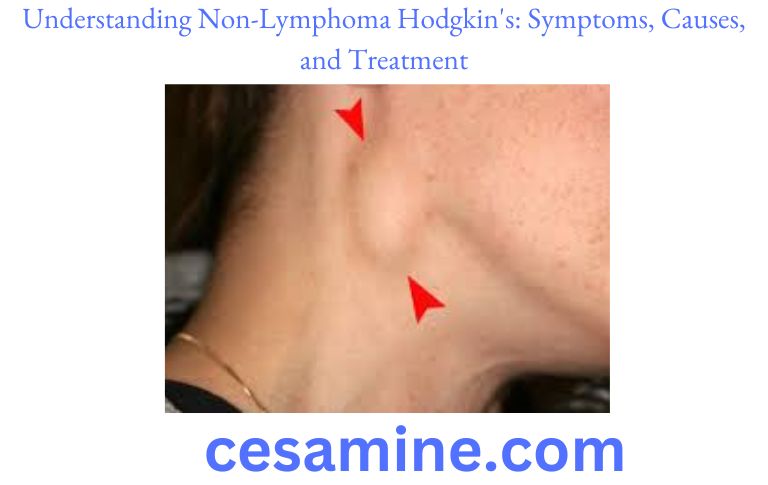Is non-lymphoma Hodgkin’s usually indicated by swollen and enlarged lymph nodes?
Non-lymphoma Hodgkin’s often involves enlarged or swollen lymph nodes, but there is something unique about them that is unrelated to enlargement from other causes.
One kind of blood cancer that manifests in many ways is known as non-Hodgkin lymphoma. All malignant blood disorders have a different course and set of symptoms depending on the sort of cancer they are, specifically where they are located in the lymphatic system.
This particular kind of lymphoma may sometimes go totally unnoticed until the tumour has grown significantly.

Non-lymphoma Hodgkin’s or an infection?
Even the so-called non-lymphoma Hodgkin’s cannot always be diagnosed if a patient has one or more of the symptoms that are often associated with blood cancers. Some of the typical symptoms of lymphoma can seem like illnesses. However, be cautious to call your doctor if any of these symptoms persist or appear in combination:
- Swollen lymph nodes
- Chest discomfort or pressure, enlarged stomach, frequent chills, weight loss, persistent weariness, and a sense of fullness after just a little meal
- Severe or persistent infections, shortness of breath, or an unexpected cough
- Frequent bleeding or easy bruising.
- Swollen lymph nodes, non-lymphoma, Hodgkin’s and so-called B symptoms
B symptoms are indications of non-lymphoma Hodgkin’s that might occur in certain patients. Which are:
- Fever (lasting many days to several weeks without illness) (lasting several days to several weeks without infection)
- Morning sweats
- Unintended loss of weight (at least 10 percent of body weight in the short term)
- Lymph nodes with swelling.
Lymph nodes may get larger and swell as a result of non-Hodgkin lymphoma.
Large lymph nodes may be felt as lumps beneath the skin or can be seen as masses with the naked eye on the sides of the neck, in the groyne region, under the armpits, or above the collarbone. Typically, they are not painful.
Enlarged lymph nodes are a typical sign of lymphoma, although infections are much more often to blame for them.
Reactive or hyperplastic lymph nodes are lymph nodes that are a result of the body’s response to infection. Most of them have tactile sensitivity.
Abdomen-specific non-lymphoma Hodgkin’s symptoms
Abdominal lymphomas that form might result in abdominal discomfort or edoema. Enlarged lymph nodes or organs, such the spleen or liver, may cause swelling or discomfort. Large fluid accumulation is another potential reason.
In rare instances, pressure from an enlarged spleen on the stomach may result in lack of appetite and a sense of fullness even after consuming just a modest quantity of food. Stomach discomfort, nausea, and vomiting may also be brought on by lymphomas in the intestines or stomach.
Chest Lymphoma Warning Signs
The trachea in the windpipe may be compressed if non-Hodgkin lymphoma spreads to the thymus or chest lymph nodes. This results in chest discomfort or pressure, coughing, and shortness of breath.
The primary venous blood artery in the top part of our bodies is the superior vena cava. It travels through the chest close to the lymph nodes and thymus. The superior vena cava may be under strain from lymphomas in this region.
The blood may then back up into the veins, resulting in swelling that may sometimes seem bluish-red in the upper chest, arms, and head. Breathing issues and the potentially fatal illness known as superior vena cava syndrome are also possibilities in this situation.
Symptoms of non-Hodgkin lymphoma that impact our skin and brain
Primary brain lymphomas (brain lymphomas) may result in headaches, difficulty thinking, weakening in certain body parts, changes in personality, and sometimes specific convulsions.
The region surrounding the brain and spinal cord may get infected by other forms of lymphoma. As a consequence, individuals may have issues including speech alterations, facial numbness, and double vision.
Read More Articles :
- “5 Surprising Symptoms of Diabetes: What Your Nails Can Tell You”
- “Managing Type 1 Diabetes with Insulclock: A Comprehensive Guide”
- 10 Best Fruits For Diabetics
- 5 Best And Worst Fruits For Managing Blood Sugar
- 5 Supplements You Shouldn’t Be Taking, According to a Dietitian
- 7 Best Tips To Help You Stay Fuller for Longer
- 7 effective ways to reduce salt intake in your meals
- 7 Healthy Dates Or Khajoor Recipes For People With Diabetes
- A New Approach to Treating Diabetes
- Adding These Whole Grains To Your Diet Helps Control Blood Sugar Levels
- Antidepressants Also Reduce Positive Emotions
- Ayurveda Expert On How Many Almonds One Should Consume As Per Digestive Capacity
- Benefits of Guava Fruits and Guava Leaves
- Best Prebiotic Foods You Must Include In Your Diet
- Bladder Cancer Takes a Toll on Mental Health. Here’s How to Cope
- Blood Pressure And Diabetes Regulating Food
- Boosting Immune System: The Key to Fighting off Viral Infections
- Can milk cause conditions including the common cold, exhaustion, inflammation, and type 2 diabetes?
- Cancer Deaths More Common Among Older Adults With Type 2 Diabetes
- Cancer Stem Cells Are Fueled Through Dialogue With Their Environment
- Celery Juice Health Benefits and Side Effects
- Corticobasal Degeneration: Warning Signs Of The Degenerative Disease